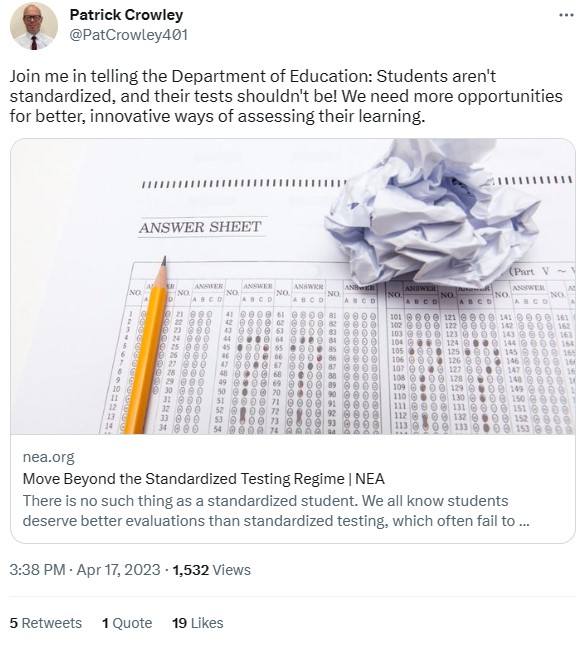
Don’t miss the fact teachers unions want standardization… for themselves.
Sometimes the cognitive dissonance from special-interest ideologues’ commentary is so strong it’s difficult to know whether they’re brainwashing, trolling, or both. Consider this tweet from Rhode Island labor union executive and progressive activist Patrick Crowley:

Before Crowley moved up the union-organizer ranks and was still specifically with the National Education Association of Rhode Island, I had occasion to argue policy with him from time to time, and he was not shy about deploying the standard talking points. Ask a professional union advocate why super-effective teachers shouldn’t be paid more than mediocre or marginal ones, and they’ll give you some variation of: “We advocate for an excellent teacher in every classroom.”
In short, they respond with a dream in which all professionals in an occupation can be standardized at the very highest level, evading the fact that a standardized, one-size-fits-all contract will be more attractive to those who are below the average than above it.
Interesting arguments can be had about this topic, but notice the contrast with Crowley’s tweet. Why couldn’t supporters of standardized testing just say: “We advocate for excellent results for all students.” They do say such things, and the NEA’s response isn’t about the complexities of testing, evaluation, and accountability, but is a propagandistic appeal to emotion: “there is no such thing as a standardized student.”
I’m no fan of a system that relies on standardized tests as more than one of many datapoints, but the way the public school system is structured at the moment, such tests are the only option for accountability. Naturally, the teacher unions oppose any measure that might begin to expose (1) the ineffectiveness of the system that treats them so well and (2) either the differential effectiveness of teachers or the irrelevance of teacher effectiveness.
A better approach would be to move away from standardization altogether — including standardization of teacher compensation as well as standardization of enrollment, by which I mean assigning children to schools based on where they live.
Schools that operate according to standardized contracts and enrollment will find it easy to come up with non-standardized reasons that every child is benefiting from their services, but the parents and the public can have no trust in their proclamations. The alternative is to allow schools to manage their teachers according to the non-standardized measures of effectiveness that any organization can develop and then allow families to assess and choose schools according to their own non-standardized priorities.
Featured image by Niamat Ullah on Unsplash.


Schools Are Ditching Homework, Deadlines in Favor of ‘Equitable Grading’ – WSJ
I often wonder how often these schemes are designed to make teachers look better, rather than actually benefit the students,
I just used niche.com to pull up my local school system. Average teacher salary is 77K. The system, K-12, is graded B- in quality. I wonder what salaries would raise us to B+.
“That’s the news from Lake Wobegon, where all the women are strong, all the men are good-looking, and all the children are above average.”